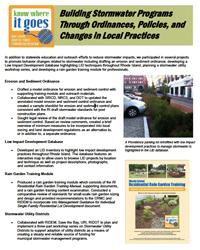Stormwater Policy and Practices

In any project that aims to change behavior, it is important to recognize the benefits of both voluntary and mandatory action. Our statewide message sought to inform Rhode Islanders about the scary nature of stormwater, in an irreverent and humorous way, and provide them with a collection of simple steps that could prevent or mitigate nonpoint source pollution. However, we recognize that knowledge is just one step toward behavior change. Some communication theorists have argued that sometimes one has to change behavior first and the corresponding knowledge and beliefs will change with it.
We took a step in that direction by drafting an updated model erosion and sediment ordinance, which was adopted in some form by most municipalities.
We created a Low Impact Development Database, showcasing stormwater-friendly best management practices around the state.
We provided training to landscape professionals in the design and installation of rain gardens to support the development of this Low Impact Development practice.
We helped plan a workshop series to support the creation of municipal stormwater districts in Rhode Island.
We assisted five MS4s with storm drain marking events, involving more than 170 participants and marking a total of 834 drains in South Kingstown, Narragansett, Westerly, Tiverton, and University of Rhode Island.
